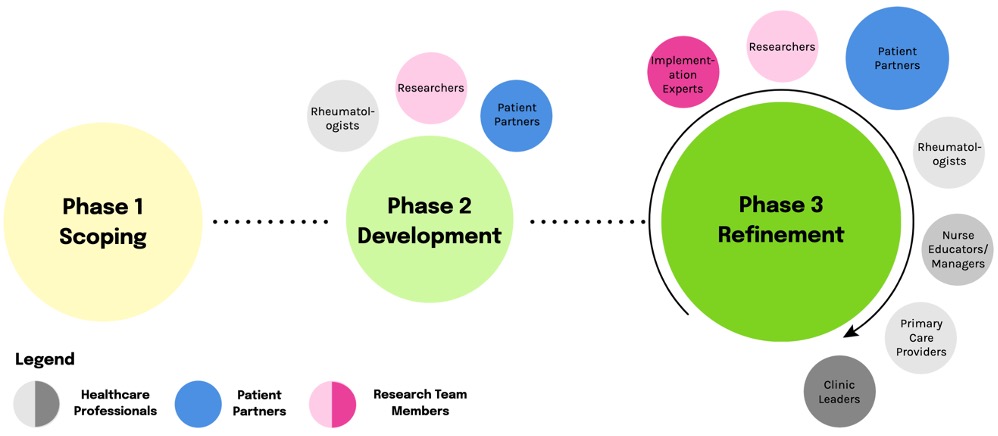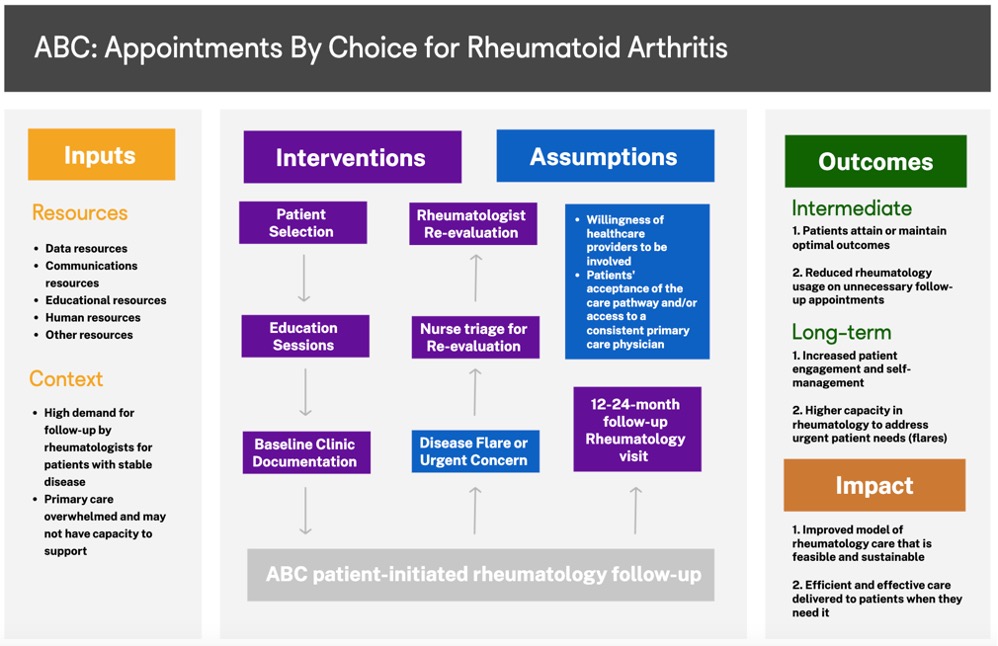Session Information
Session Type: Poster Session B
Session Time: 10:30AM-12:30PM
Background/Purpose: Timely, high-quality care is critical to effective rheumatoid arthritis (RA) management. Due to the resource-intensive nature of routine lifelong follow-ups and rheumatologist shortages, RA care needs in the province of Alberta (population: 4.4 million) are not being met. Over 3000 individuals are waiting to see a rheumatologist, while existing patients with urgent health concerns (e.g. RA flares) cannot access follow-up care in a timely manner. Additionally, 20-50% of routine follow-ups at 3-12-month intervals may be unnecessary (i.e. no treatment changes or new concerns). Patient-initiated models, where follow-up intervals are extended beyond 12 months according to patient needs, can reduce inefficiencies and improve care access. To address RA care challenges in Alberta, we co-developed a theory of change (TOC) for patient-initiated follow-up care.
Methods: A TOC details an intervention and its intended impact on outcomes of interest. Its creation requires a structured process wherein partners collaboratively define health services interventions for implementation testing. We worked with a diverse team of 35 healthcare leaders, implementation experts, and patient partners to co-develop a TOC for patient-initiated RA follow-up care. A 3-phase approach was used (Figure 1). During the scoping phase, we held informal discussions with healthcare leaders and reviewed evidence on patient-initiated follow-up models to assess their implementation potential. During the development phase, we drafted a TOC map using scoping phase findings and clinical and patient expertise (Figure 2). During the refinement phase, we iteratively adapted the TOC with healthcare and patient partners. Anonymous feedback was collected via polls. Meetings were recorded, transcribed, and analyzed using inductive thematic content analysis alongside poll results and informal feedback to guide TOC refinement.
Results: The scoping phase detailed challenges in RA care (i.e. lengthy waitlists, unnecessary appointments) and the potential of a patient-initiated follow-up model to address them. TOC discussions highlighted two themes about the model’s intended impact: (1) efficient and effective care for patients when needed, and (2) a more sustainable RA care model. After drafting the TOC map, partner feedback in the refinement phase covered 4 topics: (1) preference for an interdisciplinary flare clinic over a shared care model with primary care, (2) patient selection, (3) patient education, and (4) patient monitoring. Tools and strategies were co-developed with our partners to better support patients (e.g. a decision tool to prompt patient-provider discussion around suitability) and the health system (e.g. monthly team meetings to monitor provider burden). The final TOC for patient-initiated follow-up in RA details the care pathway, key resources and considerations, and evaluation outcomes.
Conclusion: A patient-centered, contextually tailored model for patient-initiated RA follow-up care was co-developed with patient and healthcare partner input. Next, an implementation pilot will test its safety, feasibility, and effectiveness for addressing RA care challenges.
To cite this abstract in AMA style:
Ester M, White K, Dhiman K, Zafar S, Charlton A, Hazlewood G, Zimmermann G, Hoens A, Manske S, Lacaille D, Perry M, Barber M, Fifi-Mah A, Panich N, Szpunar M, Then K, Osinski K, Subdar S, Al-Azem H, Jung M, Barber C. A Theory of Change for Patient-Initiated Follow-Up Care in Rheumatoid Arthritis [abstract]. Arthritis Rheumatol. 2024; 76 (suppl 9). https://acrabstracts.org/abstract/a-theory-of-change-for-patient-initiated-follow-up-care-in-rheumatoid-arthritis/. Accessed .« Back to ACR Convergence 2024
ACR Meeting Abstracts - https://acrabstracts.org/abstract/a-theory-of-change-for-patient-initiated-follow-up-care-in-rheumatoid-arthritis/


